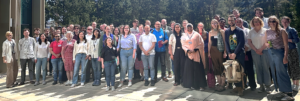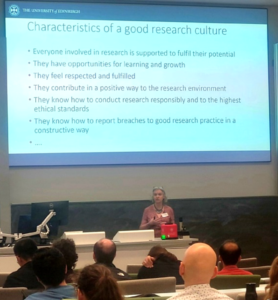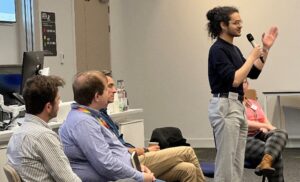In this guest blog Pamela Knoll, Postdoctoral Fellow at the Institute for Condensed Matter Physics and Complex Systems, discusses the inaugural College of Science and Engineering (CSE) Postdoc Symposium that was held on the 15th May 2025. Pamela and other researchers across the College, as part of the CSE PDRA Forum, were involved in organising the symposium with the CSE Research Culture Team.
Most postdoctoral measuring sticks are based on research output. Whether it is the number of publications, conference presentations, or grants awarded, these all assumed to directly correlate with scientific productivity. However, the focus needs to move beyond the anxiety-driven race to build a bigger and better CV for rare academic job openings. This was the central message of the first PostDoc Symposium held by the College of Science and Engineering (CSE), organised by CSE’s Research Culture Team along with the PDRA Forum. As elegantly pointed out in the keynote address by Sara Shinton, PhD, it is important to also “enjoy the journey.”

The day was organised to address this key transition, manoeuvring from “making the most” of a tough situation to “enjoying the journey”. While this is easier said than done, the symposium was aimed to discover how CSE can support postdocs in this regard by creating an open dialogue between CSE leadership and postdoctoral researchers. The opening talk by Prof. Jane Hillston set the stage with the importance of research culture in academia. While good outputs are not necessarily an indicator of good research culture, Prof. Hillston explained, being surrounded by good research culture is the best way for groups and individuals to thrive and reach their highest potential.

A shining example of building support within the school is the BioDocSoc in the School of Biological Sciences (SoBS). Dr. Dan Nussey reflected on the formation and growth of the postdoctoral society in SoBS. Its foundation and continued purpose are to facilitate the unique journey of the PDRAs within their School through mentorship programmes, training workshops, overall support from colleagues and mentors.
From research, to teaching, to grant writing, to figuring out the next phase, no two paths are identical. This was well demonstrated by the Careers Panel, which included scientists from academia, government, and industry. After brief introductions, attendees continued the conversation with panel members during the career round robin. In addition, the symposium offered a parallel session with round tables to discuss other key topics for postdocs such as applying for funding, popular science writing, mentoring students, and equality, diversity, and inclusion.

The interactive activity was an opportunity for postdocs and research staff to identify their concerns and provide feedback on effective resolutions to these issues. Common themes included better communication, clarity, and stronger professional development from direct managers, from Schools, and from the University.
The postdoctoral life has been described as the “honeymoon phase” of academia by staff holding permanent positions. This sentiment comes from a different vantage point well beyond this career stage and is less likely to resonate with current post-doctoral researchers. So can postdocs manoeuvre from “making the most” of the tough situation to “enjoying the journey”? One comment from the interactive activity states “I think any kind of change is possible. Please take our feedback seriously.” It seems that although morale is low, there is still hope, hope for now and hope for improving the framework for future PDRAs and research staff.
(Image by Gerd Altmann from Pixabay)


